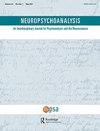意识、分裂和动态无意识:对克恩伯格的评论
Q3 Psychology
引用次数: 2
摘要
摘要Otto Kernberg提出了一种将神经生物学和客体关系相结合的复杂方法,并呼吁对驱动理论和动态无意识进行修正。这篇评论简要介绍了克恩伯格对驱动理论的修正,然后重点介绍了他的分裂理论和动态无意识理论。尽管克恩伯格关于情感系统、冲突和动态无意识的理论做出了重要贡献,但在能够全面评估他的提议之前,他的理论中仍有一些空白需要解决。本文章由计算机程序翻译,如有差异,请以英文原文为准。
Consciousness, splitting, and the dynamic unconscious: Commentary on Kernberg
ABSTRACT Otto Kernberg presents a sophisticated approach integrating neurobiology and object relations and calling for revisions to both drive theory and the dynamic unconscious. This commentary briefly addresses Kernberg’s revision of drive theory before focusing upon his theory of splitting and the dynamic unconscious. Although Kernberg’s theory of affect systems, conflict, and the dynamic unconscious provides an important contribution, there are nevertheless several gaps in his theory that require addressing before being able to fully assess his proposal.
求助全文
通过发布文献求助,成功后即可免费获取论文全文。
去求助
来源期刊

Neuropsychoanalysis
Psychology-Neuropsychology and Physiological Psychology
CiteScore
2.50
自引率
0.00%
发文量
24
 求助内容:
求助内容: 应助结果提醒方式:
应助结果提醒方式:


